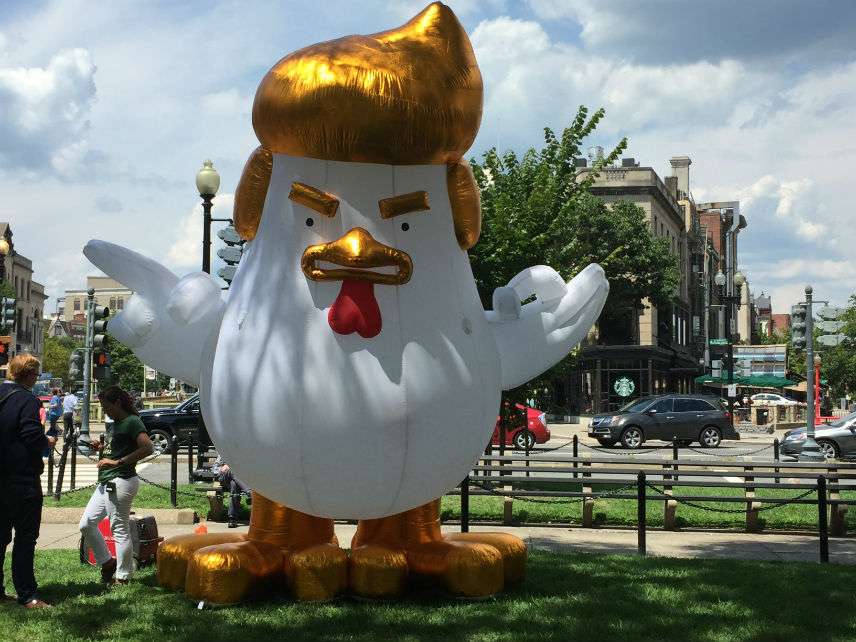Giant Inflatable Chicken Appears in D.C., and It's Not Happy About Tax Cuts
"Chicken Don" is gearing up for a fight over tax reform.

Donald Trump's refusal to release his tax returns on the campaign trail didn't block his presidential aspirations. But now, nearly seven months after his inauguration, Trump's tax chickens have finally come home to roost.
This week a giant inflatable chicken bearing a striking similarity to the 45th president has appeared in Washington, D.C., and it is not happy about Trump's lack of personal tax transparency, nor about the possibility of cuts to individual and corporate tax rates.
On Wednesday the chicken and a clutch of supporting activists from the Tax March Coalition nested outside the White House. When those same activists and their inflated avian mascot migrated over to DuPont Circle—a couple of blocks from Reason's office—we decided to check out the bird and his message for ourselves.
Nicole Gill, executive director of the coalition and spokesperson for "Chicken Don," said the bird had served as the group's mascot since the April 15 anti-Trump Tax March in D.C. "We are gearing up for an intense fight in the fall to stop what the Republicans in Congress want to do, which is pass devastating tax cuts for millionaires, billionaires, and wealthy corporations," she tells Reason, adding that "the chicken doesn't support tax cuts for rich people."
Whatever tax reform plan Republicans finally cobble together will likely include tax cuts for high income earners, and possibly corporations (an idea with bipartisan support). Why is Chicken Don so opposed to letting the wealthy keep a few more of their golden eggs?
"The rich and wealthy and wealthy corporations are already gaming the tax system to their advantage. There are a number of corporations that don't even pay any taxes whatsoever," says Gill. "Donald Trump himself actually tweeted that corporate profits are at a record high. If that's true, those companies should pay more in taxes. They should pay their fair share."
A Tax Foundation report found that the top 10 percent of income earners paid 70 percent of all income taxes, despite earning only 47 percent of all taxable income.
"High income earners have ways of getting around paying their taxes. The hard-working people of America are not afforded that luxury," she responds. "They deserve to have access to the services that our taxes go toward. Things like Medicare, Medicaid, Social Security, and education funding."
The United States already spends a bundle on the programs Gill listed. Combined Medicare and Medicaid spending inked out to $1.19 trillion in 2015. Does Gill think that these programs need to be funded more?
"What we're witnessing right now is historic lows for funding for those programs," she replies, adding that she might have to double-check those numbers, but "any tax cuts that are passed by the Republicans will have to be paid for somehow, and they will end up cutting those programs in order to pay for them."
For the record, the United States does not spend a historic low on anything. Federal government spending as a percentage of GDP has been hovering around the 20 percent mark since the end of World War II. Entitlement spending of the type Gill referenced takes up about 15 percent of GDP, well over the 5 percent it was at in 1962.
And while its every libertarian's fever dream that tax cuts might actually be paid for with cuts to spending, that is rarely the case, instead being financed by more debt and deficit spending.
Aside from some Tax March staffers and a few other reporters, Chicken Don did not seem to be attracting many pro-tax passers-by to the cause. Reason interviewed a few bystanders happily taking pictures of the mascot. None wanted to go on record, but several sources close to the chicken said their attendance was driven by curiosity, not politics.
